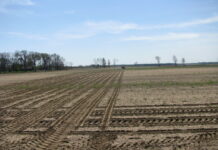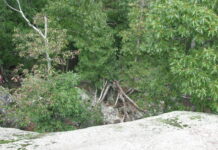Photo credit: DiasporaEngager (www.DiasporaEngager.com).
The United Nations Famine Review Committee (FRC), a panel of experts in international food security and nutrition, has cast doubt on the notion that the northern Gaza Strip is suffering through a famine.
In a report released earlier this month, the committee responded to a claim by the Famine Early Warning Systems Network (FEWS NET) — a US-created provider of warning and analysis on food insecurity — that a famine was likely underway in northern Gaza. FEWS NET said that northern Gaza began experiencing famine in April and projected that the embattled enclave would endure famine until at least July 31.
The FRC rejected the assertion that northern Gaza is experiencing famine, citing the “uncertainty and lack of convergence of the supporting evidence employed in the analysis.” The panel carries out evaluations of humanitarian conditions on behalf of the Integrated Food Security Phase Classification (IPC), an international famine monitoring initiative.
The FRC added that there is not sufficient evidence to confirm the existence of a famine within northern Gaza and called for more humanitarian access into the warzone, providing experts an opportunity to give an accurate assessment of the conditions.
“The very fact that we are unable to endorse (or not) FEWS NET’s analysis is driven by the lack of essential up-to-date data on human well-being in northern Gaza, and Gaza at large,” the report stated. “Thus, the FRC strongly requests all parties to enable humanitarian access in general, and specifically to provide a window of opportunity to conduct field surveys in northern Gaza to have more solid evidence of the food consumption, nutrition, and mortality situation.”
However, the panel warned that Gaza is still enduring “extreme human suffering” and called for the “complete, safe, unhindered, and sustained” transport of aid into the enclave.
The report represents a course-reversal for the FRC, which claimed that Gaza likely surpassed the “famine thresholds for acute malnutrition” in March. The FRC now contends that civilians in Gaza are experiencing improved humanitarian conditions as a result of increased aid flowing into the war-torn enclave.
“Since the FRC review conducted in March 2024, there seems to have been a significant increase in the number of food trucks entering northern Gaza,” the report read.
“The FEWS NET analysis acknowledges that humanitarian assistance in the area has increased significantly, finding that caloric availability from humanitarian assistance increased from 9 percent in February to 34 percent to 36 percent in March and 59 percent to 63 percent in April. The opening of alternative routes to the Rafah and Kerem Shalom crossings, the authorization of commercial truck entry, as well as airdrops, allowed for an increase of food availability,” the report continued.
Several aid agencies, media outlets, and politicians, as well as pro-Palestinian activists, have repeatedly accused Israel of inflicting famine on Palestinians since beginning its military operations in Gaza following Hamas’ Oct. 7 slaughter of over 1,200 people throughout southern Israel. Josep Borrell, the European Union’s foreign policy chief, accused Israel of using starvation as a “weapon of war.”
Despite these allegations, data produced by the United Nations showed that Israel allowed more than 100 food trucks to enter Gaza per day in March, an increase from the daily average of 70 trucks before the war. Moreover, many trucks transporting aid into Gaza have been hijacked and seized by Hamas terrorists, increasing the difficulty of distributing food to civilians.
Source of original article: Middle East – Algemeiner.com (www.algemeiner.com).
The content of this article does not necessarily reflect the views or opinion of Global Diaspora News (www.GlobalDiasporaNews.com).
To submit your press release: (https://www.GlobalDiasporaNews.com/pr).
To advertise on Global Diaspora News: (www.GlobalDiasporaNews.com/ads).
Sign up to Global Diaspora News newsletter (https://www.GlobalDiasporaNews.com/newsletter/) to start receiving updates and opportunities directly in your email inbox for free.


































